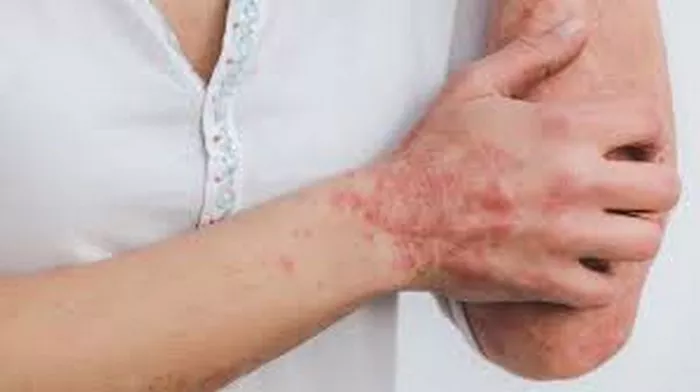Psoriasis is a chronic skin condition that causes red, scaly patches on the skin. Many people with psoriasis experience itching. The urge to scratch can be strong, but is scratching psoriasis bad? In this article, we will explore the effects of scratching, why it happens, and what you can do to manage the itchiness.
Understanding Psoriasis
What Is Psoriasis?
Psoriasis is an autoimmune disease. This means that the body’s immune system mistakenly attacks healthy skin cells. This leads to rapid skin cell production. The excess cells build up, forming thick, scaly patches. Psoriasis can occur anywhere on the body, but it most commonly affects the elbows, knees, scalp, and lower back.
Types of Psoriasis
There are several types of psoriasis, including:
Plaque Psoriasis: The most common form, characterized by raised, red patches covered with thick, silvery scales.
Guttate Psoriasis: Often starts in childhood or young adulthood and appears as small, drop-shaped spots.
Inverse Psoriasis: Appears as smooth, red patches in skin folds.
Pustular Psoriasis: Characterized by white pustules (blisters) surrounded by red skin.
Erythrodermic Psoriasis: A severe form that affects most of the body surface.
Why Does Psoriasis Itch?
The Itching Mechanism
The itching associated with psoriasis can be attributed to several factors:
Inflammation: The immune system’s response leads to inflammation in the skin, which can cause itching.
Dry Skin: Psoriasis often leads to dry skin. Dryness can exacerbate itching.
Nerve Sensitivity: Inflammation can make skin nerves more sensitive, increasing the sensation of itchiness.
Psychological Factors
Stress, anxiety, and other psychological factors can also contribute to the urge to scratch. The itch-scratch cycle can become a vicious loop where scratching leads to more itching.
Is Scratching Psoriasis Bad?
Short-Term Effects of Scratching
In the short term, scratching psoriasis may provide temporary relief from itching. However, this relief comes at a cost:
Skin Damage: Scratching can break the skin, leading to cuts and bruises.
Bleeding: Persistent scratching may cause bleeding, which can be painful.
Infection Risk: Open wounds from scratching can become infected, complicating the psoriasis condition.
Long-Term Effects of Scratching
The long-term effects of scratching psoriasis can be more severe:
Worsening Symptoms: Scratching can trigger the body to produce more skin cells, worsening the psoriasis.
Thickening of Skin: Chronic scratching can lead to thickened skin (lichenification), making the condition more difficult to treat.
Psoriatic Arthritis: In some cases, scratching may contribute to the development of psoriatic arthritis, a painful joint condition associated with psoriasis.
Managing Itching in Psoriasis
Effective Treatment Options
Managing the itching associated with psoriasis is crucial. Here are some effective treatment options:
Topical Treatments: Creams and ointments containing corticosteroids can reduce inflammation and itching.
Moisturizers: Regular use of moisturizers can help keep the skin hydrated and reduce dryness.
Coal Tar: This is a traditional treatment that can soothe itching and reduce scaling.
Vitamin D Analogues: These can help slow down skin cell growth and reduce scaling.
Lifestyle Modifications
Certain lifestyle changes can help manage psoriasis and reduce itching:
Bathing Practices: Taking lukewarm baths with added oils or oatmeal can soothe itching. Avoid hot water, as it can dry the skin.
Avoiding Triggers: Identify and avoid personal triggers, such as certain foods, stress, or environmental factors.
Stress Management: Techniques like meditation, yoga, or deep breathing can help reduce stress and the urge to scratch.
Behavioral Strategies
Keeping Nails Short: Short nails can reduce the damage caused by scratching.
Using Cold Compresses: Applying a cold, damp cloth can provide temporary relief from itching.
Distracting Yourself: Engaging in activities that keep your hands busy can help reduce the urge to scratch.
Seeking Professional Help
If scratching is causing significant problems, it may be time to consult a healthcare professional. They can provide a comprehensive treatment plan tailored to your needs.
When to See a Doctor
You should seek medical advice if:
- You notice signs of infection, such as increased redness, swelling, or pus.
- The itching becomes unbearable and affects your daily life.
- Over-the-counter treatments are not providing relief.
Conclusion
In conclusion, scratching psoriasis can lead to various negative consequences. While it may provide temporary relief, it can also worsen the condition and lead to complications. Managing the itch associated with psoriasis is essential for maintaining skin health and overall well-being. By understanding the triggers and utilizing effective treatments and strategies, individuals with psoriasis can reduce their urge to scratch and improve their quality of life. Always consider consulting a healthcare professional for personalized advice and treatment options.
Related topics:


























